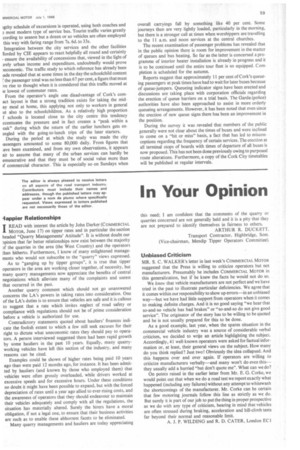In Your Opinion
Page 61

If you've noticed an error in this article please click here to report it so we can fix it.
gappier Relationships y READ with interest the article by John Darker (COMMERCIAL I MOTOR, June 17) on tipper rates and in particular the section headed "Quarry Managements' Attitude". It is without doubt our )pinion that far better relationships now exist between the majority )f the quarries in the area (the West Country) and the operators than hitherto. Furthermore, I know of many enlightened managements who would not subscribe to the "quarry" views expressed.
As to "ganging up by tipper groups", it is true that tipper operators in the area are working closer together, of necessity, but many quarry managements now appreciate the benefits of central negotiations which alleviate many of the complaints and unrest that occurred in the past.
Another, quarry comment which should not go unanswered concerns the LA's powers in taking rates into consideration. One of the LA's duties is to ensure that vehicles are safe and it is callous to suggest that a rate which invites neglect of road safety or compliance with regulations should not be of prime consideration before a vehicle is authorized for use.
Contradictory statements quoted about hauliers' finances indicate the foolish extent to which a few still seek excuses for their right to dictate what uneconomic rates they should pay to operators. A person interviewed suggested there had been rapid growth by some hauliers in the past 10 years. Equally, many quarryworking vehicles have left this section of the industry, and many reasons can be cited.
Examples could be shown of higher rates being paid 10 years ago than were paid 12 months ago, for instance. It has been admitted by hauliers (and known by those who employed them) that vehicles were often grossly overloaded, while drivers worked at excessive speeds and for excessive hours. Under these conditions no doubt it might have been possible to expand, but with the forced depreciation of rates until a year ago allied to ever-rising costs, and the awareness of operators that they should endeavour to maintain their vehicles adequately and comply with all the regulations, the situation has materially altered. Surely the hirers have a moral obligation, if not a legal one, to ensure that their business activities are such as to enable these abhorrent facets to be eliminated.
Many quarry managements and hauliers are today appreciating this need; I am confident that the comments of the quarry or quarries concerned are not generally held and it is a pity that they are not prepared to identify themselves in fairness to others. ARTHUR R. DUCKETT. Transport Contractor, Highbridge, Som. (Vice-chairman, Mendip Tipper Operators Committee).
Unbiased Criticism MR. S. C. WALKER's letter in last week's COMMERCIAL MOTOR suggested that the Press is willing to criticize operators but not manufacturers. Presumably he includes COMMERCIAL MOTOR in this generalization, but if he knew the facts he would not do so.
We know that vehicle manufacturers are not perfect and we have tried in the past to illustrate particular deficiencies. We agree that it comes within our responsibility to show up errors—in an unbiased way—but we have had little support from operators when it comes to making definite charges. And it is no good saying "we hear that so-and-so vehicle has bad brakes" or "so-and-so do not give good service". The originator of the story has to be willing to be quoted and he is not usually prepared for this to be done.
As a good example, last year, when the spares situation in the commercial vehicle industry was a source of considerable verbal criticism, we decided to write an article highlighting the subject. Accordingly, 41 well-known operators were asked for factual information or, at least, their general views on the subject. How many do you think replied? Just two! Obviously the idea collapsed. And this happens over and over again. If operators are willing to criticize manufacturers verbally—and many won't do even this— they usually add a hurried "but don't quote me". What can we do?
On points raised in the earlier letter from Mr. E. G. Corke, we would point out that when we do a road test we report exactly what happened (including any failures) without any attempt to whitewash the shortcomings of the manufacturer. Mr. Corke can be certain that few motoring journals follow this line as strictly as we do. But surely it is part of our job to put the thing in proper prospective as we do with any type of criticism, bearing in mind that vehicles are often stressed during braking, acceleration and hill-climb tests far beyond their normal and reasonable limit.
A. J. P. WILDING and R. D. CATER, London EC 1




























































































































